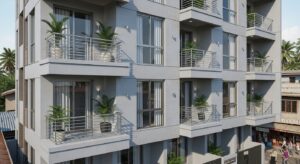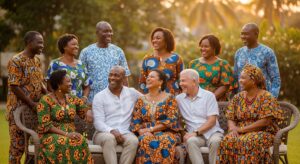The Ghanaian real estate sector is entering a period of unprecedented growth, and one of the most significant yet underleveraged forces driving this momentum is the African diaspora. With increasing purchasing power, a growing desire to reconnect with the continent, and a strong appetite for secure investment vehicles, diaspora investors are uniquely positioned to shape the future of Ghana’s urban development.
This article explores why the diaspora matters now more than ever — and why the real estate market must evolve to meet their needs.
The Diaspora’s Economic Footprint in Ghana
According to the Bank of Ghana, remittances from the diaspora totaled $4.7 billion in 2023, representing nearly 6% of Ghana’s GDP. A significant portion of these funds are channeled into housing, construction, and land acquisition.
In fact:
- The Ghana Statistical Service reports that 26% of diaspora remittances go into real estate-related spending (land, construction, home renovations).
- Diaspora-led property purchases have increased by over 40% between 2019 and 2023, especially in Greater Accra, Central Region, and parts of the Eastern Region.
This positions the diaspora not just as a source of inflows, but as primary investors in long-term physical infrastructure.
Urban Expansion: A Market Ripe for Development
Ghana’s population is projected to reach 40 million by 2050, with over 70% expected to live in urban areas. The demand for housing is already outpacing supply, with an estimated housing deficit of over 1.8 million units.
This creates a critical opportunity for the diaspora to:
- Fund affordable and mid-income housing projects
- Purchase land for residential or commercial development
- Invest in smart cities, eco-communities, and rental properties
In areas like East Legon Hills, Pokuase, and Prampram, demand from overseas buyers is already pushing up land values by 8–12% per year, according to data from the Ghana Real Estate Developers Association (GREDA).
Why the Diaspora Is a Unique Buyer Segment
Unlike local investors, diaspora buyers are:
- Cash-ready: Many diaspora investors can pay upfront or secure financing from abroad.
- Focused on legacy: They are more likely to invest in long-term value properties rather than short-term flips.
- Higher standards of transparency: They demand clear title, verified ownership, and international standards in property documentation and construction.
- Technology-driven: Diaspora buyers are more likely to use digital platforms, virtual tours, and remote signing services to facilitate purchases.
This makes them ideal clients for developers, agencies, and governments looking to attract high-quality, long-term investors.
Key Real Estate Investment Trends Among Diaspora Buyers
- Off-Plan Developments
Diaspora buyers are increasingly purchasing properties off-plan from trusted developers, often at 15–20% below market value. - Gated Community Purchases
These offer added security, amenities, and ease of management, especially for those living abroad. - Land Banking
Younger investors in their 30s and 40s are acquiring land on the outskirts of Accra and Kumasi for future development or resale. - Rental Property Investment
Airbnb and furnished long-term rentals are attractive options for diaspora buyers who want passive income from their properties.
Challenges Facing Diaspora Investors — and How to Solve Them
While the opportunity is vast, many diaspora investors face obstacles:
- Land fraud and litigation risks
- Lack of verified property listings
- Inadequate legal representation
- Limited support for remote transactions
This is where professional firms like DPN Global come in — providing:
- Access to verified land and property portfolios
- Full legal due diligence
- Remote buyer support and consultation
- Development and post-purchase services
Policy Opportunities to Unlock Diaspora Investment
Government initiatives like the Diaspora Engagement Policy and the Year of Return campaign have built emotional bridges. The next step is to strengthen economic bridges.
Recommendations include:
- Incentivizing diaspora housing bonds
- Offering tax benefits for diaspora-funded construction
- Creating dedicated real estate investment desks in embassies and consulates
- Enhancing digital land registry platforms for transparency
The Future of Ghana’s Real Estate Is Global — But Rooted in Home
As urbanization accelerates and housing demand continues to rise, the diaspora will be central to bridging the gap between supply and aspiration. Their financial contributions, global experience, and commitment to heritage give them an unmatched role in shaping Ghana’s real estate future.
For Ghana to realize its full potential, diaspora engagement must move beyond sentiment to strategy — and real estate is where that transformation begins.
Are You a Diaspora Investor Looking to Buy Property in Ghana?
DPN Global is your trusted partner for verified, secure, and seamless real estate investments in Ghana. We serve diaspora clients from the U.S., U.K., Canada, Europe, and beyond — helping them invest in land, homes, and commercial property with confidence.







